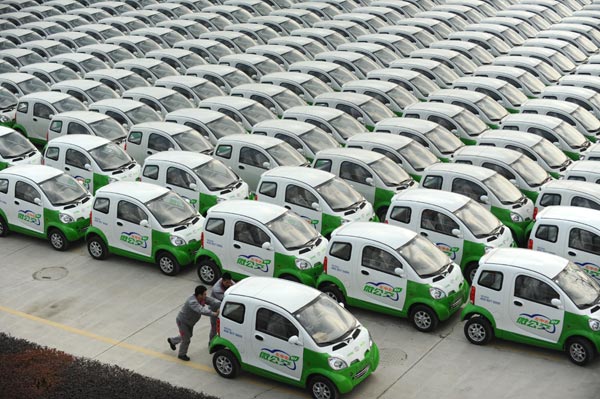|
 |
|
The manufacturing base of Zhejiang Kandi Auto Group, a new-energy vehicle producer. [Photo/China Daily] |
Passenger-vehicle sales in China gained 12 percent last month, led by demand for sport-utility vehicles and minivans in the world's largest auto market.
Retail deliveries of cars, multipurpose and SUVs climbed to 1.78 million units in March, the China Passenger Car Association said on its website on Thursday.
SUV sales surged 64 percent in March and minivan deliveries jumped 26 percent, while sedan demand fell 0.6 percent, according to the data.
"Auto sales have been driven by replacement demand or families buying a second vehicle, so SUVs are a natural choice as they seek something different," said Yale Zhang, Shanghai-based managing director of Autoforesight Shanghai Co.
"Local automakers have also launched many SUV products in recent years."
Automakers from Ford Motor Co to Daimler AG have opened new plants in China this year, lured by millions of first-time buyers and replacement demand. A Chinese manufacturing gauge rebounded in March after the central bank cut interest rates twice in the last six months to bolster growth in the world's second-largest economy.
Great Wall Motor Co, China's biggest sport-utility vehicle maker, posted a 19 percent surge in deliveries last month. The automaker has said it will resume selling its most expensive SUV, the H8 model, in April.
China's electric car production surges
China's new-energy vehicle production jumped threefold to 25,400 vehicles year-on-year in the first quarter of 2015, the Ministry of Industry and Information Technology said on Thursday.
The output of pure electric passenger cars rose 400 percent from a year earlier to 11,000 cars, with plug-in hybrid passenger cars rising nearly 500 percent to 7,257 in the first three months of this year.
The output of pure electric and plug-in hybrid commercial vehicles went up by 500 percent and 61 percent, respectively.
In March alone, Chinese car makers produced 13,500 new energy vehicles, increasing threefold compared to March 2014.
Intense promotion by the government has brought more new-energy vehicles onto China's roads, saving energy and reducing pollution.
In March, the Ministry of Transport set a target of having 300,000 new-energy vehicles on China's roads by 2020.
Its guideline, encouraging the production and purchase of new-energy vehicles, set a target of 200,000 new-energy buses and 100,000 new-energy taxis and delivery vehicles by 2020.
China will continue to encourage the construction of charging facilities for new-energy vehicles in cities and implement tax exemptions and subsidies for car purchases, said the Ministry of Transport.
